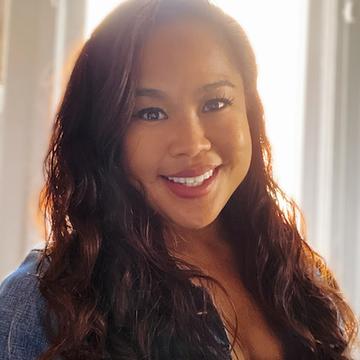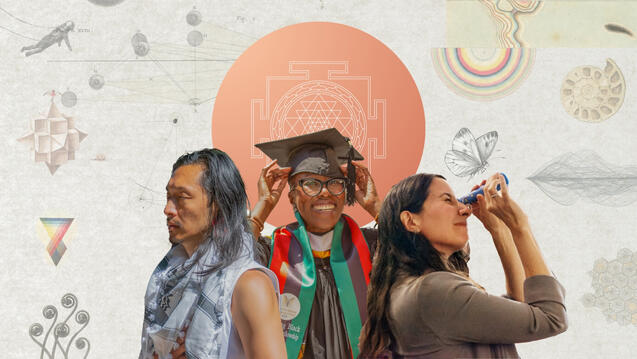A Free Online Overview with Jennifer Gruczelak, Nikole Moffett and Dennis Spears

Ph.D. in Psychology, Concentration in Integral Transpersonal Psychology
Rooted in the practitioner-scholar model, our students engage in rigorous academic coursework, in addition to completing their dissertation.
Program Overview
About the Ph.D. in Psychology, Concentration in Integral Transpersonal Psychology
The program consists of core requirements, research courses, electives, a written comprehensive exam, an oral comprehensive exam, and a dissertation. Courses in this program require letter grades (except Residential Intensives).
This course of study is situated within our Ph.D. in Psychology, which focuses on whole-person approaches to research and systematic knowledge-building. Whole-person psychologies expand the horizons of psychology to include the body’s ways of knowing and moving as an expression of the interconnected living, breathing systems of community, society, and world. From this perspective, it becomes possible to ask new and compelling research questions that lie close to the heart of what it is to be human.
Career Paths
This research-oriented degree is designed for scholars and practitioners who want to develop new kinds of knowledge that emerge from transpersonal practices.
Graduates will be able to contribute their enhanced expertise in areas such as the following:
- Psychotherapy
- Counseling
- Teaching
- Writing
- Research
- Organizational or business consulting
- Social change work
Curriculum
The curriculum for the Ph.D. in Psychology, Concentration in Integral Transpersonal Psychology, is designed to help students acquire new knowledge and to further develop skill sets in critical thinking, writing, and research so they are prepared for dissertation writing and research. Once they complete coursework (36 units) and a written and oral comprehensive exam, students are eligible to enter dissertation proposal writing.
Once their dissertation proposal is approved, they advance to candidacy and can begin work on the dissertation. Students write a dissertation proposal and dissertation under the supervision of a CIIS core faculty member, or a faculty member approved by the program chair to chair dissertation, and are supported by a dissertation committee of three members (chair, plus two other members, including an external committee member).
Curriculum Highlights
ITP 7185 Imaginal Psychology (3 units) Imagination is essential to psyche, bound up with perception, memory, and creativity, but too often dismissed as insubstantial or unreal. This course will examine imagination as an irreducible phenomenon through both scientific and spiritual frameworks. The topic will be approached through multiple lenses, including, history, philosophy, culture, and religion, with particular emphasis on depth psychology and neuroscience.
ITP 7190 Parapsychology (3 units) This course explores in depth the important, yet often poorly understood areas of experimental parapsychology and the psychology of anomalous experience. The history and development of parapsychology from its origins in psychical research, haunting investigations and sittings with mediums through to modern-day laboratory research will be critically examined. We'll evaluate whether there is a scientifically sound evidence base for the ontological reality of various different paranormal claims and will explore the psychological impact of paranormal experiences to see if they can be engaged with and made sense of in ways that are psychologically beneficial for the experiment. In this way, we will look to bring together the rigor and discipline of the scientific method and the fundamentally personal and meaning orientation of direct, lived experience.
ITP 7221 Unconscious Roots of Racism (3 units) This course examines the potential roots of functional racism as a consumptive and confrontational force through the lenses of integral/transpersonal and critical traditions and theories. Students will explore perspectives and practices from BIPOC and Western traditions that recognize and mitigate these forces. Course content includes topics such as contemporary Black American, Kemetic Egyptian, Buddhist, and Native American traditions, as well as Western orientations such as depth psychology.
ITP 7227 Defining Psychedelics (3 units) This course seeks to explore, map, and frame the parameters of the field of "contemporary psychedelic work". With the re-emergence of psychoactive substances as novel mental health treatments, "the psychedelic renaissance" is upon us. Yet a series of questions remain to be answered, including the very nature of the field itself. What are psychedelics? Medicine? Drug? Sacrament? This class engages in a high-level survey of the framework behind the field, looking at who are the key players engaged in shaping its emergence are and what their biases might be. It addresses the intersection of traditions and disciplines occurring in the field today, with the intention of understanding both the historical roots of "psychedelic work" and how the field emerging today is informed by those roots, while also exploring possibilities for future directions.
ITP 7235 Origins of Transpersonal Psych (3 Credits) This course offers an overview of the origins of integral and transpersonal psychology and charts the development of major theories in the field, with particular emphasis on historical, philosophical, and cultural contexts. It explores transpersonal psychology's attention to altered states of consciousness as well as spiritual, mystical, and other exceptional human experiences as meaningful areas for psychological inquiry. Students read and reflect on readings throughout the semester and prepare a final research paper.
-
Ph.D. in Psychology, Concentration in Integral Transpersonal Psychology
Three years, part-time study
36 Units, plus dissertation at .10 unit per semester
Semester 1 | Fall (6 units)
ITP 7235 Origins of Transpersonal Psychology (3 units)
ITP 7188 Scholarly Writing with Integral and Transpersonal Studies (2 units)
ITP 7231 Integral Psychology (1 unit)
Semester 2 | Spring (6 units)
ITP 7222 Foundations of Research (2 units)
ITP 7186 Critical Thinking with Integral & Transpersonal Psychologies (3 units)
ITP 7890 Integrative Seminar (1 unit)
Required, self-directed, online exam in General Psychology for students who do not enter with psychology degree or courses of study. Students with psychology degree or course of study may request exemption. Due by the start of Semester 3.
Semester 3 | Fall (6 units)
ITP 7201 Qualitative Research Methods (2 units)
Elective (3 units, ITP, EWP, or other department, by approval)
ITP 7885 Advanced Topics: Contemporary Issues in Integral Transpersonal Psychology (1 unit)
Semester 4 | Spring (6 units)
ITP 7232 Transpersonal Inquiry (2 units)
Elective (3 units, ITP, EWP, or other department, by approval)
ITP 7895 Mentorship (1 unit)
Written Comprehensive Exam is completed between semesters 4 and 5 and due at the start of semester 5. Students must pass this exam to enroll in ITP 6898: Proposal Development.
Semester 5 | Fall (6 units)
ITP 7234 Integral/Transpersonal Pedagogy/Oral Exam (3 units)
Elective (3 units, ITP, EWP, or other department, by approval)
Semester 6 | Spring (6 units)
ITP 6898 Proposal Development (3 units)
Elective (3 units, ITP, EWP, or other department, by approval)
Semester 7 and beyond
ITP 9800 Dissertation Proposal (up to three semesters) (0.1 unit)
ITP 9900 Dissertation Seminar (0.1 unit)
Residential Intensives also required (0.10 units)
ITP 7001-7006 Residential Intensive I-VI
Entry Requirements
Successful candidates for admission in the program typically have the following qualifications: a vision that is compatible with the program’s mission; regular engagement in practices focused on personal growth and/or spiritual growth; maturity and stability to pursue independent self-inquiry, and sustained research; competence in communication and dialogical skills; demonstration of respect for a diversity of viewpoints; an openness to multiple ways of knowing and whole-person learning; the ability to clearly articulate educational, professional, and research goals; outstanding scholarly writing skills; and a prospective specialization that is consonant with the program’s mission and faculty expertise. Many students enter the doctoral program with a clinical licensure degree (e.g.,LMFT) with the goal of bringing philosophical and spiritual depth to their practice or becoming qualified for new professional opportunities such as teaching. Completion of this program by itself does not lead to a professional license or certification.
Required Application Materials
Online Admissions Application: Begin the application process by submitting an online application and paying the non-refundable $68 application fee.
Degree Requirement: A bachelor’s and master’s degree (M.A., M.S., or the equivalent) from an accredited college or university.
Minimum GPA: A GPA of 3.0 or higher in previous coursework is required. However, a GPA below 3.0 does not automatically disqualify an applicant and CIIS will consider a prospective student whose GPA is between 2.0 and 3.0. These individuals are required to submit a GPA Statement and are encouraged to contact the Office of Admissions to discuss their options.
Transcripts: Official transcripts from all accredited academic institutions attended where seven or more credits have been earned. If transcripts are being mailed to CIIS, they must arrive in their official, sealed envelopes. Transcripts from institutions outside the US or Canada require a foreign credit evaluation through World Education Services (WES) or CIIS will also accept foreign credential evaluations that are in a comprehensive course-by-course format from the current members of the National Association of Credential Evaluation Services (NACES).
Two Letters of Recommendation: Letters of recommendation will be accepted from academic advisors, professors, professional supervisors, or someone able to attest to your ability to undertake the work required for your program. Ideally, one letter of recommendation should be from an academic source and the other from a professional source. Recommenders should use standard business format and include full contact information-name, email, phone number, and mailing address.
Academic Writing Sample: A writing sample of eight-to-ten pages (typed, double-spaced) that demonstrates your capacity to think critically and reflectively and demonstrates graduate level writing abilities, including proper citations. You may submit copies of previous work, such as a recent academic paper, article, or report that reflects scholarly abilities.
Autobiographical Statement: A three-to-four page (typed, double-spaced) statement describing the personal, professional, and educational experiences that have led to your decision to apply. Discuss why you believe this program is the next right step for you, and your readiness to undertake doctoral level studies at this time.
Goal Statement: A one-to-two page (typed, double-spaced) statement of your educational and professional objectives. Include questions that are currently engaging your curiosity and how you might use the resources of the curriculum and program faculty to advance your curiosity through research.
Resume/CV
Candidate Selection
Successful candidates for admission into the Ph.D. in Psychology, concentration in Integral Transpersonal Psychology programs typically have the following qualifications:
- A vision that is compatible with the program's mission
- A path of personal growth and/or spiritual growth
- Sufficient maturity and stability to pursue independent self-inquiry and sustained research
- Competence in communication and dialogical skills
- Demonstration of respect for a diversity of viewpoints
- An openness to multiple ways of knowing and whole-person learning
- The ability to clearly articulate educational, professional, and research goals
- Outstanding scholarly writing skills
- A prospective specialization that is consonant with the program's mission and faculty expertise
Events and Info Sessions
A Faculty-Led Info Session with Cindy Shearer and Theresa Newman
Attend the Fall Open House on October 11, 2025 to get to know your admissions counselors and learn more about CIIS' bachelor's, master's, and Ph.D. programs.



Take the Next Step
For over 50 years, CIIS has been at the forefront of education that integrates rigorous science, innovative scholarship, and social justice. You will learn from faculty at the forefront of their fields, local artists and activists, and a community of peers as passionate and dedicated as you. There’s never been a better time to be here – let’s build a healthier and more equitable world.




